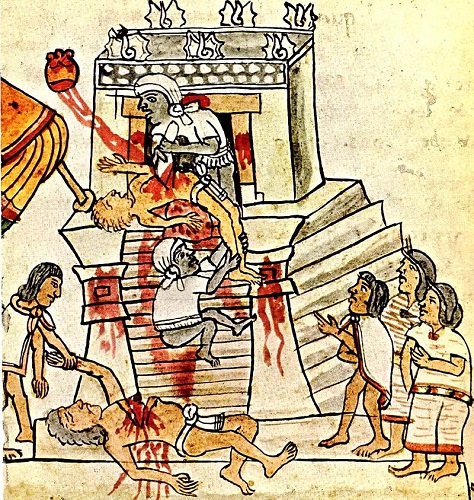
Take the torch of tradition, to illuminate yourselves with reason.
(Ange-Louis Janet. France illuminating the world. [Source])
Let's Adore Jesus-Eucharist! | Home >> Lost Sermons

Take the torch of tradition, to illuminate yourselves with reason.
(Ange-Louis Janet. France illuminating the world.
[Source])
The Media constantly bombards our ears with expressions like "our cultural identity", or "the enrichment caused by contact with other cultures", or "we have to protect our culture", etc. But what does the word "culture" mean?
First, a few disclaimers. I'm far from an expert on the topic. Moreover, vague and fashionable words like "culture" can often have many meanings, without one being officially better than the other. And I'm not the Oxford English Dictionary!
In my opinion, the word "culture" has at least two meanings: "culture-custom" and "culture-tradition". "Culture-custom" is "We've always done it that way, so let's continue". The "weight" of a custom is only composed of the inertia of habits.
"Culture-tradition" is more complicated. Tradition has all the weight of a custom, but there is something more. Not only "have we always done things this way", but on top of that there is a good reason to do things like that!

Aztec human sacrifice.
[Source]
This distinction between "culture-custom" and "culture-tradition" is very important for the Catholic Church. Indeed, the Church is sometimes confronted with cultures at least partially incompatible with the Gospel. For example, the culture of Aztec indians included, since time immemorial, human sacrifices. Ripping out the guts of poor innocent persons, in order to "apease the gods", was part of the cultural identity of this people, of its history, of its fundamental values.
Except this was a completely crazy "culture-custom". There was no reason justifying this practice. God doesn't drink human blood, and if you want good harvests, it's more logical to make these poor innocents work to install a modern irrigation system, rather than gutting them and throwing them down a long stairway. The Catholic missionaries who taught these indians to reject that "culture-custom" were perfectly right to do so. They didn't respect this culture, fortunately!
If you're too bogged down in political correctness to be able to digest the example of Aztec indians, take another example. Suppose you're a green missionary, and you must "evangelize" the USA. You'll observe that the "culture of the automobile" is dominant, that for many generations, car tires have been going round and round on the asphalt, while the US economy goes round and round around cars, and Nature goes round in a downward spiral towards disaster. Will these natives suffer cultural shock if you try to convert them to the bicycle? Yes, but you'll do well to convert them. Their "culture-custom" is not reasonable.

(Lawrence R. Batchelor. First Ursuline nuns with Indian students, in Quebec City.
[Source])
Putting a Crucifix in a public place is not a "culture-custom". There are good reasons to keep the tradition of Crucifixes in our public spaces, even if most Quebecers became non-Christians. See: A Crucifix For Pagans?
Moreover, Jesus is not a "culture-custom". Even if no inhabitant of Quebec were Catholic, it would still be good to convert them all to Catholicism. Without Jesus, we are spiritually blind men who aimlessly walk in a completely dark room. Without Jesus, we are condemned to a painful life here on Earth, and to an eternity of suffering in Hell:
All men having lost innocence in Adam's prevarication [Rm 5:12; 1Co 5:22], "having become impure" [Is 64:6] and [...] "children of wrath by nature" [Ep 2:3] [...], they were so "slaves of sin" [Rm 6:20] and under the power of the Devil and death, that not only Pagans, by the force of nature, but also Jews, by the very letter of Moses' Law, could not liberate themselves or get out of this state, even if free will was by no means extinguished in them, even though it was weakened and deviated in its force.
Whereupon the heavenly Father, "Father of mercies and God of all consolation"
[2Co 1:3],
sent to men Jesus Christ His Son, announced and promised both before the Law and
during the time of the Law to many holy Fathers
[Gn 49:10-18],
when came this blessed "fulness of time"
[Ep 1:10;
Ga 4:4],
so that, on the one hand, "He might redeem the Jews subject to the Law"
[Ga 4:5]
and that on the other hand, "the Pagans who did not seek justice, would attain
justice"
[Rm 9:30],
and that all would receive filial adoption
[Ga 4:5].
It is He whom "God set forth as propitiatory victim, through Faith, by His blood"
[Rm 3:25]
"for our sins, and not for our sins only but for those of the whole world"
[1Jn 2:2].
[Council of Trent, 6th Ses., decree on Justification, Dz 1521-1522]
Maybe you have the custom of always using the word "culture". Take rather the torch of tradition, to illuminate yourself with reason.
Let's Adore Jesus-Eucharist! | Home >> Lost Sermons